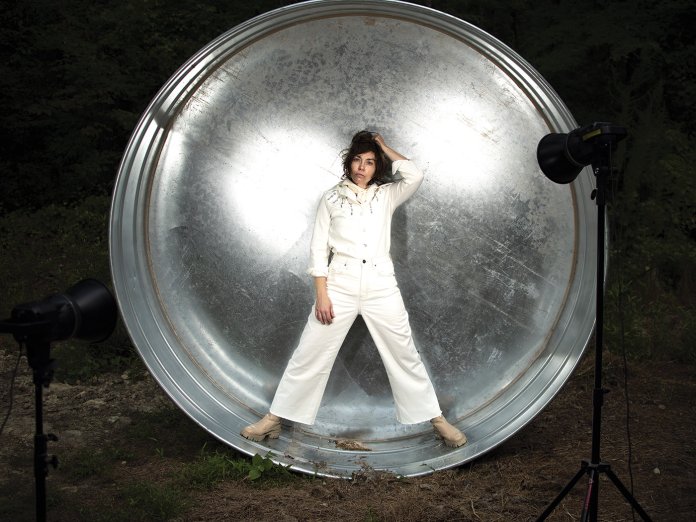“Shadows”, a standout on H.C. McEntire’s new album, ends with a muted chorus of frogs and crickets and other Carolina wildlife. It’s a stark yet vivid cacophony of natural sounds, which the singer-songwriter recorded near her former home in North Carolina. It arrives like quiet punctuation a...
“Shadows”, a standout on H.C. McEntire’s new album, ends with a muted chorus of frogs and crickets and other Carolina wildlife. It’s a stark yet vivid cacophony of natural sounds, which the singer-songwriter recorded near her former home in North Carolina. It arrives like quiet punctuation at the end of that gently despairing song, the “amen” after a prayer – yet you’d swear you could hear those noises throughout Every Acre, perhaps even on every album she’s ever made. In her solo career and stretching back even to her work with the bands Bellafea and the great Mount Moriah, McEntire has always found inspiration in the Tarheel countryside and in its long musical history: she has turned the state’s forests and hollers and rivers and snakes and deer into songs that pay no attention to the boundary fences between gospel and country and folk and psychedelic rock.
Eclectic and immersive and unabashedly beautiful, Every Acre is the culmination of McEntire’s long collaboration with North Carolina. Every one of these songs includes a line like “cattails catching all the copperheads” or “yield is rich with yellow pine” and “steady picking out bobcat skulls”. She’s in love with these sights, but she also loves the way those words sound, the way “vidalias” falls off a Southern tongue: vih-day-lee-uhs, that last syllable a long and molasses-slow breath. Listening to this album, you get the sense that these songs are specific not just to the Tarheel State, but to those acres on the Eno River, just a few miles from Durham but a world away from any city, where she lived for a decade before relocating last year.
Even as she’s tethered to the terrain around her home, McEntire branches out musically on Every Acre. When Mount Moriah disbanded and she went solo with 2018’s Lionheart, her music was rooted in a muddy strain of country and folk, with clear inspiration from acts like Indigo Girls and Lucinda Williams as well as Dolly Parton and Tammy Wynette. On that album and especially on songs like “Baby’s Got The Blues” and “Red Silo”, the music allowed her to evoke her upbringing in the western end of the state, revelling in the details of an outdoor childhood. Her 2019 cover of Led Zeppelin’s “Houses Of The Holy” signalled a shift toward psychedelic rock on 2020’s Eno Axis. (In a wink, though, she recited the lyrics to “Stand By Your Man” during the outro on that cover, as though such disparate songs emanated from the same human urge.)
Every Acre picks up that psych-rock thread, as McEntire gives her band a little more freedom to cut loose. Bassist Casey Toll and drummer Daniel Faust have been playing with her for years, yet they sound more inventive here, rooting “Rows Of Clover” and “Soft Crook” in intricate Crazy Horse rhythms. She and guitarist/co-producer Luke Norton make space for rumbling guitar licks and even a lengthy solo at the end of “Turpentine” (which features backing vocals from Indigo Girl Amy Ray). The droning sitar on “Big Love” evokes a bucolic trippiness, as does the forest ambience that undergirds closer “Gospel Of A Certain Kind”: more wind and rain and another chorus of frogs. At times Every Acre sounds like Pink Floyd if they’d started out in rural Appalachia rather than the UFO Club.
“Dovetail” is a straightforward hymn, complete with churchly piano and a melody that owes as much to 19th-century poet and composer Fanny J Crosby as to North Carolina old-time icon Alice Gerrard. The lyrics conjure a parade of different women and their shared yet often unspoken desires: churchgoing wives who “eat only after they pray” and others, more reckless, who “chase their whiskey with wine”. Toward each and every one of them McEntire displays a landslide of compassion, partly because she sees a little of herself in their cautions and traumas and wants. Every one of these songs is a big-hearted meditation on love and sex and faith and especially healing, as though what roots us to our own lands is loss and grief and recovery.
With its steady gallop and funereal piano, “Rows Of Clover” could be McEntire’s dreamy reimagining of Zeppelin’s “No Quarter”, but it reveals a grieving, sobbing heart, as she buries a “steadfast hound” in the yard: “It ain’t the easy kind of healing”, she declares, “when you’re down on your knees, clawing at the garden”. There’s a similar tragedy, a similar grave, on every acre, and while healing is never easy, it’s the hardship that makes everything so much sweeter.



